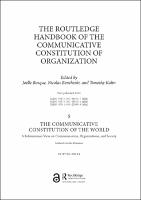Chapter 5 The Communicative Constitution of the World
Proposal review
A Luhmannian View on Communication, Organizations, and Society
| dc.contributor.author | Grothe-Hammer, Michael | |
| dc.date.accessioned | 2022-04-12T12:05:15Z | |
| dc.date.available | 2022-04-12T12:05:15Z | |
| dc.date.issued | 2022 | |
| dc.identifier.uri | https://library.oapen.org/handle/20.500.12657/53959 | |
| dc.description.abstract | This chapter introduces Niklas Luhmann’s theory of organizations, which he conceived as communicatively constituted social systems that are created through decision-making. Decisions are thereby also understood as communicative events, ones that are inherently paradoxical as they attempt to select a certain option while simultaneously communicating discarded alternatives. Decisions are, hence, fragile events provoking opposition and rejection. Organizations can be understood as social phenomena that are capable of de-paradoxifying decisions by featuring these very decisions as their main mode of operation. However, Luhmann asserts that not only organizations, but our entire social world is constituted through communication. Against this backdrop, this chapter also highlights the role of macro-societal domains such as politics, science, economics, and love. Like organizations, these macro-societal domains can be understood as communicatively constituted systems that have certain characteristics and effects. In this respect, the Luhmannian framework offers a communication-based counterprogram to the mainstream debates of institutionalism. | en_US |
| dc.language | English | en_US |
| dc.subject.classification | thema EDItEUR::K Economics, Finance, Business and Management::KJ Business and Management::KJP Business communication and presentation | en_US |
| dc.subject.classification | thema EDItEUR::K Economics, Finance, Business and Management::KJ Business and Management::KJU Organizational theory and behaviour | en_US |
| dc.subject.classification | thema EDItEUR::G Reference, Information and Interdisciplinary subjects::GT Interdisciplinary studies::GTC Communication studies | en_US |
| dc.subject.other | communication, organization, management, authority, agency, materiality, discourse, organizational culture, qualitative methods | en_US |
| dc.title | Chapter 5 The Communicative Constitution of the World | en_US |
| dc.title.alternative | A Luhmannian View on Communication, Organizations, and Society | en_US |
| dc.type | chapter | |
| oapen.identifier.doi | 10.4324/9781003224914-7 | en_US |
| oapen.relation.isPublishedBy | 7b3c7b10-5b1e-40b3-860e-c6dd5197f0bb | en_US |
| oapen.relation.isPartOfBook | 694282d0-af12-4d5e-b978-0a63cd01fa6a | en_US |
| oapen.relation.isbn | 9780367480707 | en_US |
| oapen.relation.isbn | 9780367480721 | en_US |
| oapen.imprint | Routledge | en_US |
| oapen.pages | 17 | en_US |
| oapen.remark.public | Funder name: Norwegian University of Science and Technology in Trondheim, Norway | |
| peerreview.anonymity | Single-anonymised | |
| peerreview.id | bc80075c-96cc-4740-a9f3-a234bc2598f1 | |
| peerreview.open.review | No | |
| peerreview.publish.responsibility | Publisher | |
| peerreview.review.stage | Pre-publication | |
| peerreview.review.type | Proposal | |
| peerreview.reviewer.type | Internal editor | |
| peerreview.reviewer.type | External peer reviewer | |
| peerreview.title | Proposal review | |
| oapen.review.comments | Taylor & Francis open access titles are reviewed as a minimum at proposal stage by at least two external peer reviewers and an internal editor (additional reviews may be sought and additional content reviewed as required). |

